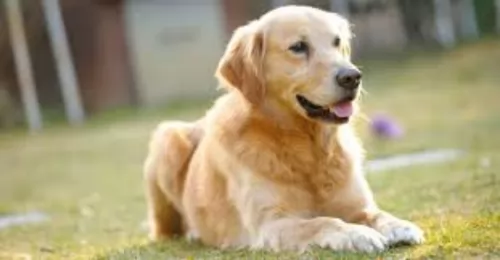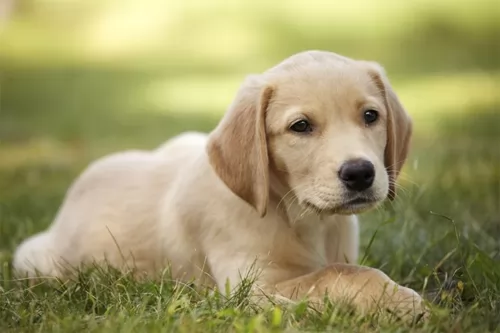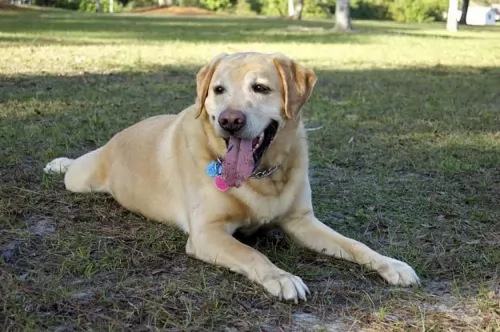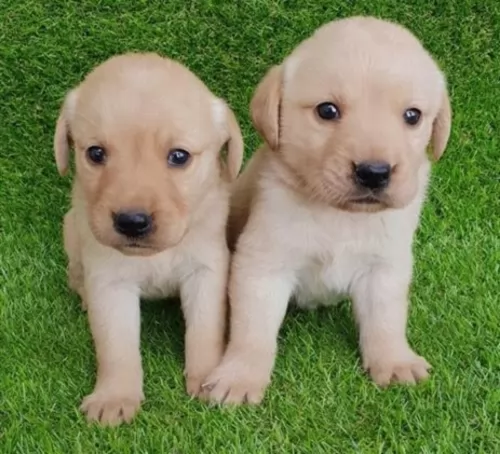 Petzlover
Petzlover Goldador is originated from United States but Maremma Sheepdog is originated from Italy. Goldador may grow 12 cm / 4 inches shorter than Maremma Sheepdog. Goldador may weigh 9 kg / 19 pounds lesser than Maremma Sheepdog. Both Goldador and Maremma Sheepdog has almost same life span. Goldador may have more litter size than Maremma Sheepdog. Goldador requires Low Maintenance. But Maremma Sheepdog requires Moderate Maintenance
Goldador is originated from United States but Maremma Sheepdog is originated from Italy. Goldador may grow 12 cm / 4 inches shorter than Maremma Sheepdog. Goldador may weigh 9 kg / 19 pounds lesser than Maremma Sheepdog. Both Goldador and Maremma Sheepdog has almost same life span. Goldador may have more litter size than Maremma Sheepdog. Goldador requires Low Maintenance. But Maremma Sheepdog requires Moderate Maintenance
 Introduced as a designer dog, the Goldador is beautiful – a mix between Golden Retrievers and Labrador Retrievers, two of the most popular dog breeds in the world.
Introduced as a designer dog, the Goldador is beautiful – a mix between Golden Retrievers and Labrador Retrievers, two of the most popular dog breeds in the world.
The dog was specifically bred to be an excellent working dog, and in fact today he makes the most wonderful guide-, rescue- and therapy dog.
Known also as Golden Labradors, the Goldador is a dog that has many capabilities, one of which is to make a wonderful family pet. As a designer breed, the dog isn’t recognized as a standardized breed by any of the major kennel clubs.
 Known also as the Cane de Pastore Maremmano-Abruzzese, the Maremma Sheepdog is often referred to as the Maremmano or the Abruzzese Sheepdog.
Known also as the Cane de Pastore Maremmano-Abruzzese, the Maremma Sheepdog is often referred to as the Maremmano or the Abruzzese Sheepdog.
This is a working dog – a guardian of sheep and an indigenous dog to central Italy. The dog has been used for centuries already to guard sheep.
It was in 1924 that the first standard for the breed was published.
 The Goldador is a large muscular dog standing at between 56 – 61cm in height at the withers and weighing between 27 – 36kg in weight.
The Goldador is a large muscular dog standing at between 56 – 61cm in height at the withers and weighing between 27 – 36kg in weight.
His double coat is short and smooth but in can also be longer. It comes in shades of gold or yellow with hints of red, but it can be liver or black too. Goldadors are well-balanced dogs, and just the look in their kind brown eyes makes you realize that this beautiful dog can make a wonderful pet.
He has a well proportioned head with medium length floppy ears, a black nose and a long tail.
Loving, intelligent, loyal and playful, the Goldador is the kind of dog that gets on well with everyone. It’s why he isn’t a particularly good watchdog as he is just too friendly with strangers. You have to be careful though – his rambunctious nature, his energy and playfulness can see him being a bit rough around small children or the elderly. It is why socialization and training are so important for him as then he becomes obedient and more relaxed around everyone.
He loves his human family and never wants to be left on his own for too long. Intelligent and alert, he is an easy dog to train as he makes it easier by being a dog that wants to please.
 The Maremma Sheepdog is a large dog with a muscular build. Some people who have owned these distinctive-looking dogs say he is like a big bear. He stands at 65 to 73 cm in height, both male and female, and he weighs 35 to 45 kg.
The Maremma Sheepdog is a large dog with a muscular build. Some people who have owned these distinctive-looking dogs say he is like a big bear. He stands at 65 to 73 cm in height, both male and female, and he weighs 35 to 45 kg.
The coat is long, thick and white with a dense undercoat. If you look you’ll see flashes of pale orange or apricot amid the white. There is thicker, longer hair around the neck area.
The nose is black, the eyes brown and the ears medium length and floppy. The long tail is set low and is thickly feathered. You can expect 6 – 10 puppies from these dogs.
The Maremma has always been used to guarding sheep, and today even though he is looked upon as a wonderful, friendly companion dog, he also makes an excellent watch dog, being brave and courageous. He isn’t the kind of dog that you think of as getting wildly excited over something, as he has a dignified aura about him.
He is an independent dog, so training and sociaization will be absolutely imperative as he is strong-willed and likes to do things his way. Once trained and socialized, it is amazing to see such a large dog obeying all your commands such as ‘lie down, come, sit an stay'. He is very intelligent and shouldn’t have any trouble learning these basic commands.
He is calm and gets on well with children as well as other pets in the home. With his role as guardian of sheep, he has learned to be loyal and patient and will make a loyal ad loving family pet he takes his role as guardian very seriously.
He loves hard work, and shepherds have always appreciated the splendid work he does guarding their flocks. As a companion you will also appreciate the many excellent qualities he possesses.
The Maremma Sheepdog isn’t recommended for life in the city where there is a tiny garden. He has always been accustomed to large open spaces and requires a large garden. He won’t tolerate heat well with that thick coat of his and will require a shady spot in your garden to retreat to.
 Goldadors are intelligent dogs and they’ve been used extensively for guide- and therapy dogs, loving to be useful and busy. Its the kind of dog that thrives in a loving, active family – one that counts him in as a family member.
Goldadors are intelligent dogs and they’ve been used extensively for guide- and therapy dogs, loving to be useful and busy. Its the kind of dog that thrives in a loving, active family – one that counts him in as a family member.
He makes an exceptional family pet and companion and you can rely on him to be a loyal, loving pet.It’s why the Goldador is becoming such a sought after pet – he simply ticks all the right boxes.
 This is a beautiful dog, but large, so don’t make the mistake of wanting a large dog like this for his looks. He will be expensive to feed.
This is a beautiful dog, but large, so don’t make the mistake of wanting a large dog like this for his looks. He will be expensive to feed.
If you have the means to provide a good home for him, he is friendly and good natured, even though he is strong-willed and independent.
Provide him with a good home and you’ll have a most splendid pet and companion.
 Goldadors luckily don’t have many health issues, and as a hybrid, he has fewer health issues than pure breds.
Goldadors luckily don’t have many health issues, and as a hybrid, he has fewer health issues than pure breds.
You can say with confidence that a nutritious diet, regular exercise, good grooming, lots of love and attention and visits to the vet if your pet is ill are key aspects for maintaining good health.
There are always going to be some common health problems that your Goldie could get -
You’ll need to be checking your Labrador Retriever's floppy ears. They don’t get as much air in them as a dog with erect ears. A dog like the Goldador with floppy ears will need to have his ears cleaned for bacteria. Be very careful how you clean your pet’s ears as you can damage them if you probe too deeply.
Did you know that by spaying or neutering your Goldador can save them from getting some serious illnesses later on? Speak to your vet about it when your pet reaches 9 months to a year of age.
Goldadors can easily put on weight if they aren’t given enough daily exercise to burn off the calories. Some put on weight after being spayed or neutered and it's important to watch their weight after these procedures. Being overweight puts a lot of extra strain on a dog’s internal organs.
 This ancient dog breed is robust and can reach 11 to 13 years of age when cared for properly. Like any other dogs, he can be prone to certain health problems.
This ancient dog breed is robust and can reach 11 to 13 years of age when cared for properly. Like any other dogs, he can be prone to certain health problems.
One of these is hip dysplasia. Preventing your dog from becoming overweight can work towards preventing these kinds of musculoskeletal issues. Hip dysplasia occurs when your dog’s hip joints don’t develop properly so that the hips partially dislocate.
It is painful for your dog and it can be debilitating, leading to arthritis too and making it difficult for your pet to get around and to get up from lying down. There are a number of treatment options offered by your vet.
 Goom your Goldador regularly. He can either have short- or long hair, but he is a fairly low maintenance dog so a good brush twice a week to remove loose hairs will be good for him.
Goom your Goldador regularly. He can either have short- or long hair, but he is a fairly low maintenance dog so a good brush twice a week to remove loose hairs will be good for him.
Diet is everything, and by giving your Goldador nutritional food, you can actually lengthen his life. If you’re going to be giving him commercially manufactured food, follow the feeding guidelines on the packaging. Remember there are foods that cater specifically for a dogs age and his energy levels.
Try and give him some home-made food from time to time such as cooked rice, vegetables and chicken as well as some raw meat occasionally as this can ensure his skin and coat remain healthy.
Always provide plenty of cool, fresh water, especially seeing that he will be thirsty after a long walk or other exercise. Dehydration in a dog can be fatal.
Provide your Goldador with a warm, dry place to sleep. Make sure that it offers shelter from the sun and rain and also provides shade.
 As already suggested, this large dog will need space and he will need to be exercised. Apart from long walks in he countryside or in the park or your neighborhood, he will also need other activities that stimulate him mentally and physically.
As already suggested, this large dog will need space and he will need to be exercised. Apart from long walks in he countryside or in the park or your neighborhood, he will also need other activities that stimulate him mentally and physically.
The thick, all-weather coat of the Maremma will need a thorough bushing at least twice a week to get rid of all those loose hairs. When you are brushing him, look around for signs of ticks and fleas too and run your hands over him to feel for any unusual lumps.
The Maremma is a large-breed dog, so before you get a big dog like this, decide whether you have the financial means to feed him and look after him properly. He is going to cost a lot to feed, so think it through first.
He will need to be fed a high-quality commercial dog food which has been specially formulated for a dog of his size. Keep the food of dogs simple. We’re all tempted to feed our dog treats like things such as chocolates, coffee, nuts, onions, grapes and raisins but these can cause havoc with your dog’s stomach.
Stick to simple, nutritious food. Boiled chicken, brown rice or pasta and vegetables such as potatoes, spinach and carrots can do wonders for your pet when you sometimes mix this into his kibble.
Try and mix some raw meat into his diet occasionally. Make sure he always has access to fresh, cool water.